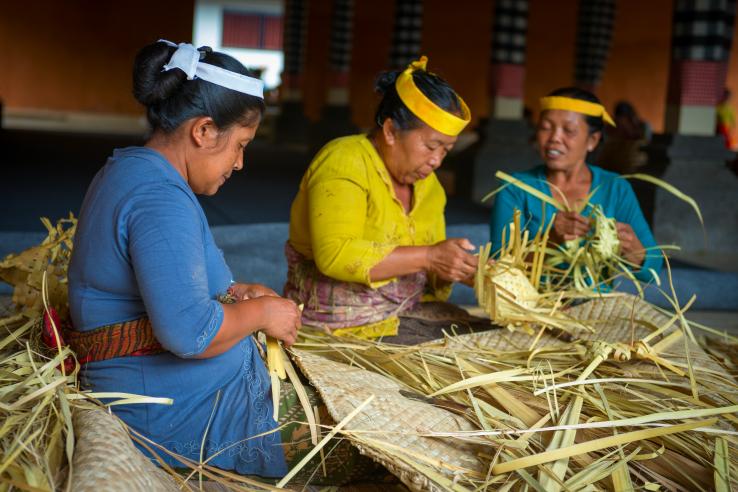About J-PAL Southeast Asia

Core Activities
Establishing long-term collaborative partnerships with our counterparts from the government, private sectors, NGOs and foundations is central to J-PAL SEA’s approach to evidence-informed policymaking. Through our three pillars, evaluation, policy outreach, and capacity building, J-PAL SEA works to ensure that policy is driven by evidence:
- Evaluation: Together with policymakers, our affiliated researchers work to identify the potential and challenges of programs aimed at reducing poverty. Using the randomized evaluation method, we conduct evaluations to test the effectiveness of these programs and look for ways to improve program delivery.
- Policy outreach: To ensure research results are translated into action,our policy team distills findings into advice and guidance to governments, NGOs, foundations, and others seeking to scale up or improve the effectiveness of their programs.
- Capacity building: We aim to cultivate a culture of evidence use. Through a series of training and workshops, we provide local researchers and partner organizations opportunities to learn more about—and become leaders in—randomized evaluations and evidence-informed policymaking.
These three pillars are closely interconnected, and cyclical: Innovative research generates important policy insights, policy outreach activities encourage evidence use and demand and trainings enhance the supply of new policy-relevant research.
Partnership Examples
J-PAL SEA’s strong local presence and wide global network strategically position us to build and sustain collaborations between researchers and policy stakeholders, including government bodies, private firms, NGOs, and other development partners. By fostering mutually-aligned interests and bridging theory with practice, we have been able to conduct fit-for-purpose research and bring about positive changes in people’s lives at a large scale. Below are several examples of nation-wide policy scale-ups that were based on evidence generated through randomized evaluations:
-
Improving the transparency and delivery of a subsidized rice program in Indonesia
In 2012, J-PAL affiliated researchers collaborated with the National Team for the Acceleration of Poverty Reduction (TNP2K) to evaluate the effectiveness of Raskin, Indonesia’s largest food assistance program. Together with TNP2K, researchers conducted a randomized evaluation in 572 villages across three provinces and found that providing official ID cards featuring information about the benefits they were eligible to receive substantially increased the total benefits received by eligible households and led to a large reduction in leakage. Informed by these results, the government decided to scale up the social assistance identification cards to over 65 million people nationwide in 2013. - Reforming Indonesia’s largest food assistance program: from Rastra to BPNT
In 2018, J-PAL affiliated researchers collaborated with TNP2K, the Ministry of National Development Planning (Bappenas), the Ministry of Social Affairs (Kemensos), and the Coordinating Ministry for Human Development and Cultural Affairs (Kemenko PMK) to compare the efficacy of BPNT non-cash assistance versus Rastra (formerly known as Raskin) in-kind transfers. To compare the effectiveness between the two, researchers conducted a randomized evaluation in 150 districts or 3.4 million households. Results suggest that not only do vouchers help concentrate aid to targeted groups, but they are also successful in reducing poverty among poor and near-poor households, and improving rice quality. In 2020, the Government of Indonesia continued the reform and expanded the coverage of the BPNT program, reaching over 18.8 million households, and increased the amount to IDR 200,000 (US$14.3) per household per month. - Adopting the community-based targeting method to combat Covid-19-induced poverty
In 2008, J-PAL affiliated researchers worked with the Indonesian Central Bureau of Statistics, the NGO Mitra Samya, and the World Bank to test the impact of three different methods to improve the targeting of a cash assistance program. Out of the three methods, researchers found that using community-based targeting to identify cash transfer recipients greatly improved local satisfaction, better matched community members’ concepts of poverty, and led to smoother disbursal processes. In 2020, the community-based targeting method was used by the government to roll out its Covid-19 relief program, in which the government distributed cash transfers to protect individuals not covered under existing social safety net programs. As of December 2020, the cash transfers had been distributed to nearly 75,000 villages and more than eight million recipients.
To further discuss how your organization can partner with J-PAL SEA, please contact Farah Amalia, our Senior Training and Communications Manager, at [email protected]. You can also subscribe to J-PAL SEA newsletter.